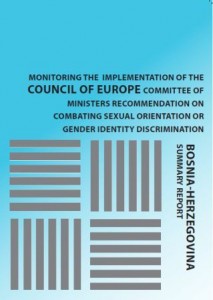Monitoring the Implementation of the Council of Europe Committee of Ministers Recommendation on Combating SOGI Discrimination
Monitoring the Implementation of the Council of Europe Committee of Ministers Recommendation on Combating SOGI Discrimination
Author(s): Mariña Barreiro, Vladana Vasić
Contributor(s): Emina Bošnjak (Editor), Dalila Mirović (Translator), Senita Džigal (Translator)
Subject(s): Gender Studies, Civil Law, Human Rights and Humanitarian Law, Labor relations, Social differentiation, Health and medicine and law, EU-Legislation
Published by: Sarajevo Open Centre
Keywords: implementation monitoring; Council of Europe Committee of Ministers; SOGI Discrimination; BiH;
Summary/Abstract: The only measure taken by Bosnian-Herzegovinian authorities in compliance with the Recommendation CM/Rec(2010)5 is the inclusion of sexual orientation and sexual expression in anti-discrimination legislation. However, in the absence of other measures, and in the face of severe social hostility, it offers little protection to lesbian, gay, and bisexual persons. So far as the Sarajevo Open Centre has been able to ascertain, the authorities have adopted no other measures to implement the requirements of the aforementioned Recommendation. In particular, there has been no review of existing legislative and other measures that could result directly or indirectly in discrimination, no provision for protection from discrimination on grounds of gender identity, and no introduction of a comprehensive strategy aimed at tackling discriminatory attitudes within the general public and correcting prejudices and stereotypes. The Recommendation and its Appendix have not been translated, and have not been disseminated either within government or civil society. A bias motive based on sexual orientation (but not gender identity) is included as an aggravating circumstance in the criminal codes of the Republic of Srpska and Brcko District, but not in that of the Federation of BiH. There appears to be no specific training for police officers and judiciary in relation to homophobic or transphobic hate crimes, nor for prison officers in relation to LGBT prisoners. There is no collection of data in this field. There are no laws prohibiting “hate speech” or incitement to hatred on grounds of sexual orientation or gender identity (including on the Internet) Although freedom of expression and assembly exist in theory for LGBT people, the violence at the time of the Queer Sarajevo Festival, and the failure of authorities to provide protection, demonstrate that the reality at that time was very different. How far things have improved will only be tested when the LGBT community gains the confidence to try to exercise freedom of expression and assembly fully again. Same-sex sexual acts are not criminalised. No steps have been taken to remove discrimination in access to rights of couples and parenting. Once gender reassignment is completed, the individual can apply for changes to the gender marker in all official documents including, as a first stage, the identification number. Therefore at least one abusive requirement, that of gender reassignment surgery, exists. The Labour Law of the Brcko District and Labour Law of the institutions of BiH prohibits sexual orientation discrimination, but equivalent legislation in the Republic of Srpska and the Federation of BiH does not. It appears that none of the other measures proposed by the Recommendation have been taken, including in relation to the armed forces, and the privacy of transgender persons. The BiH Anti-Discrimination Law, and some legal instruments at entity level, specifically prohibit sexual orientation discrimination in education, but it does not specifically include gender identity discrimination. It appears that no other measures proposed by the Recommendation have been acted on. A study of school textbooks found that some still define homosexuality as an illness and include it group of disorders such as paedophilia and drug addiction. Homosexuality is no longer classified as a disease, HIV/AIDS prevention programme includes LGBT people, and there is nothing in principle that would prevent LGBT persons identifying their partner as “next of kin”. However, it seems that other measures proposed by the Recommendation have not been carried out. The BiH Anti-Discrimination Law prohibits discrimination in the field of housing on grounds of sexual orientation, but it does not specifically include gender identity. Apart from this, there is little suggests that any steps have been taken to address the other measures proposed by the Recommendation None of the specific measures proposed by the Recommendation have been implemented in the field of measures to prevent discrimination in the field of sports. BiH law does not explicitly recognise sexual orientation or gender identity in the context of asylum. No action has been taken in relation to the measures proposed by the Recommendation. The mandate of the Ombudsman for Human Rights explicitly includes sexual orientation but not gender identity. However, the Ombudsman has included gender identity in the work of the/ Office, and has, within the limits of his resources, conducted some activities along the lines proposed by the Recommendation. However, due to lack of resources, the Ombudsman’s office does not carry out extensive public campaigns in order to promote anti-discrimination on grounds of sexual orientation and gender identity.
Series: SOC - Ljudska prava
- Page Count: 50
- Publication Year: 2013
- Language: English
- Content File-PDF
- Introduction

